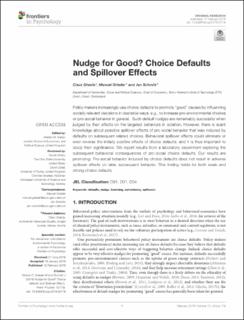Please use this identifier to cite or link to this item:
https://doi.org/10.21256/zhaw-27842Full metadata record
| DC Field | Value | Language |
|---|---|---|
| dc.contributor.author | Ghesla, Claus | - |
| dc.contributor.author | Grieder, Manuel | - |
| dc.contributor.author | Schmitz, Jan | - |
| dc.date.accessioned | 2023-05-17T08:33:48Z | - |
| dc.date.available | 2023-05-17T08:33:48Z | - |
| dc.date.issued | 2019 | - |
| dc.identifier.issn | 1664-1078 | de_CH |
| dc.identifier.uri | https://digitalcollection.zhaw.ch/handle/11475/27842 | - |
| dc.description.abstract | Policy makers increasingly use choice defaults to promote "good" causes by influencing socially relevant decisions in desirable ways, e.g., to increase pro-environmental choices or pro-social behavior in general. Such default nudges are remarkably successful when judged by their effects on the targeted behaviors in isolation. However, there is scant knowledge about possible spillover effects of pro-social behavior that was induced by defaults on subsequent related choices. Behavioral spillover effects could eliminate or even reverse the initially positive effects of choice defaults, and it is thus important to study their significance. We report results from a laboratory experiment exploring the subsequent behavioral consequences of pro-social choice defaults. Our results are promising: Pro-social behavior induced by choice defaults does not result in adverse spillover effects on later, subsequent behavior. This finding holds for both weak and strong choice defaults. | de_CH |
| dc.language.iso | en | de_CH |
| dc.publisher | Frontiers Research Foundation | de_CH |
| dc.relation.ispartof | Frontiers in Psychology | de_CH |
| dc.rights | https://creativecommons.org/licenses/by/4.0/ | de_CH |
| dc.subject | Consistency | de_CH |
| dc.subject | Default | de_CH |
| dc.subject | Licensing | de_CH |
| dc.subject | Nudge | de_CH |
| dc.subject | Spillover | de_CH |
| dc.subject | Psychology | de_CH |
| dc.subject.ddc | 150: Psychologie | de_CH |
| dc.title | Nudge for good? : choice defaults and spillover effects | de_CH |
| dc.type | Beitrag in wissenschaftlicher Zeitschrift | de_CH |
| dcterms.type | Text | de_CH |
| zhaw.departement | School of Management and Law | de_CH |
| zhaw.organisationalunit | Zentrum für Energie und Umwelt (CEE) | de_CH |
| dc.identifier.doi | 10.3389/fpsyg.2019.00178 | de_CH |
| dc.identifier.doi | 10.21256/zhaw-27842 | - |
| dc.identifier.pmid | 30809164 | de_CH |
| zhaw.funding.eu | No | de_CH |
| zhaw.issue | 10 | de_CH |
| zhaw.originated.zhaw | Yes | de_CH |
| zhaw.publication.status | publishedVersion | de_CH |
| zhaw.volume | 2019 | de_CH |
| zhaw.publication.review | Peer review (Publikation) | de_CH |
| zhaw.author.additional | No | de_CH |
| zhaw.display.portrait | Yes | de_CH |
| Appears in collections: | Publikationen School of Management and Law | |
Files in This Item:
| File | Description | Size | Format | |
|---|---|---|---|---|
| 2019_Ghesla-etal_Nudge-for-good-choice-defaults-and-spillover-effects_fpsyg.pdf | 804.89 kB | Adobe PDF |  View/Open |
Show simple item record
Ghesla, C., Grieder, M., & Schmitz, J. (2019). Nudge for good? : choice defaults and spillover effects. Frontiers in Psychology, 2019(10). https://doi.org/10.3389/fpsyg.2019.00178
Ghesla, C., Grieder, M. and Schmitz, J. (2019) ‘Nudge for good? : choice defaults and spillover effects’, Frontiers in Psychology, 2019(10). Available at: https://doi.org/10.3389/fpsyg.2019.00178.
C. Ghesla, M. Grieder, and J. Schmitz, “Nudge for good? : choice defaults and spillover effects,” Frontiers in Psychology, vol. 2019, no. 10, 2019, doi: 10.3389/fpsyg.2019.00178.
GHESLA, Claus, Manuel GRIEDER und Jan SCHMITZ, 2019. Nudge for good? : choice defaults and spillover effects. Frontiers in Psychology. 2019. Bd. 2019, Nr. 10. DOI 10.3389/fpsyg.2019.00178
Ghesla, Claus, Manuel Grieder, and Jan Schmitz. 2019. “Nudge for Good? : Choice Defaults and Spillover Effects.” Frontiers in Psychology 2019 (10). https://doi.org/10.3389/fpsyg.2019.00178.
Ghesla, Claus, et al. “Nudge for Good? : Choice Defaults and Spillover Effects.” Frontiers in Psychology, vol. 2019, no. 10, 2019, https://doi.org/10.3389/fpsyg.2019.00178.
Items in DSpace are protected by copyright, with all rights reserved, unless otherwise indicated.